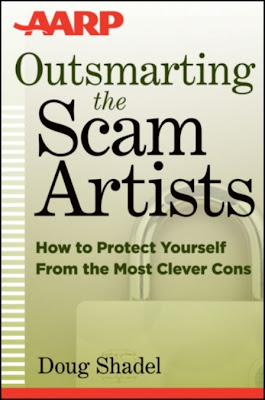Outsmarting the Scam Artists

29 Mar 2012 18:39 Africa/Lagos
AARP's Outsmarting the Scam Artists
How to Protect Yourself from the Most Clever Cons
By Doug Shadel, Fraud Expert, State Director of AARP Washington
WASHINGTON, March 29, 2012 /PRNewswire-USNewswire/ -- Think you're too smart to fall for a scam? That's just what the con artists are hoping. According to new research, plus interviews with dozens of con artists and thousands of victims, basic consumer smarts are no match for the emotional appeals that clever cons use to defraud consumers of millions of dollars every year. No matter how successful or intelligent, anyone can fall victim to a crime.
(Photo: http://photos.prnewswire.com/prnh/20120329/DC79048)
(Logo: http://photos.prnewswire.com/prnh/20070209/NYF043LOGO)
Doug Shadel, a nationally recognized fraud expert and State Director of AARP Washington, takes an insider's look into the evolution of scams and how to avoid them in this new book from AARP, Outsmarting the Scam Artists: How to Protect Yourself From the Most Clever Cons (Wiley; March 2012; ISBN: 978-1-1181-7364-0; Paperback Original & E-Book). Shadel includes both sides—testimonials from victims as well as convicted scam artists—giving the reader a solid perspective and unique peek into a scam artists' mind.
Understanding the artist behind the scam is a first step in protecting yourself and your loved ones from deceit. After conducting personal interviews with dozens of con artists and studying their personalities, Shadel has found consistent trends in the tactics they use to defraud their prey. What do they all have in common? For starters, a life filled with fast money and women, drugs and alcohol, and lots of lying and cheating. But the most successful cons are also masters of persuasion, using a sophisticated set of psychological tricks and tactics that work time and time again. Outsmarting the Scam Artists explains that while specific scams come and go, the underlying strategy and tactics never change. If you know them, you can protect yourself.
Think all victims look the same? Wrong. Outsmarting the Scam Artists explains how individual scams are carefully crafted and tailored to meet specific victim profiles. Recent research has uncovered who's most vulnerable to some of today's most prevalent scams – and the results will surprise you. Shadel offers an entire chapter titled "Who are the Victims?", digging deep into the lives of the most vulnerable. A "Fraud Vulnerability Quiz" gives readers a chance to assess their own risk along with ways to prevent being a victim based on their own behaviors.
Outsmarting the Scam Artists dedicates a chapter to some of today's most prevalent scams. But rather than stop at providing basic consumer tips, Shadel gets to the underlying emotional pitch that cons use to get consumers to throw logic out the window. Here are some examples to look out for:
Exploiting ego through the Oil-and-Gas Scam
TIP: Never make a buying decision when you are in a heightened emotional state
Exploiting faith through a Religious Ponzi Scheme
TIP: Beware of investments sold by friends or members of a group to which you belong
Exploiting fear through the Gold Coin Scam
TIP: Never buy coins from a telemarketer
Exploiting boredom through the Movie Scam
TIP: Find out if the investment deal is registered with the SEC
Exploiting hope through the Lottery Scam
TIP: Know that all foreign lottery offers are illegal in the US
Exploiting credit through the Identity Theft Scam
TIP: Limit having several credit cards
Outsmarting the Scam Artists is an insider's playbook for consumers to protect themselves and fight fraud. Readers will get a fascinating peek inside the mind of a con artist, debunking the most common myths of who is taken and why.
About the Author:
Doug Shadel is the State Director for AARP Washington and previously served as a fraud investigator and special assistant to the attorney general for the Washington State Attorney General's office.
He is a nationally recognized expert on financial fraud, having co-directed numerous studies for AARP, the AARP Foundation, the FINRA Investor Education Foundation and Stanford University. Shadel has presented his research findings at the National Academy of Sciences, the National Association of Attorneys General, the U.S. Securities and Exchange Commission and at international conferences in Germany, the Netherlands and Great Britain.
He has co-authored six previous books including three on crime prevention: Schemes and Scams (with John T.), Outsmart Crime (with Al Ward) and Weapons of Fraud (with Anthony Pratkanis). In 2000, Shadel received the FBI Director's Award for his work fighting financial fraud. He holds a Ph.D. in social science and serves on the advisory board of the Financial Fraud Research Center at Stanford University. Shadel lives in Seattle with his wife Renee, son Nick and daughter Emily.
SOURCE AARP
CONTACT: Heather Condon, Publicist, WILEY, hcondon@wiley.com, +1-201-748-6017
Web Site: http://www.aarp.org
Tweet


Comments